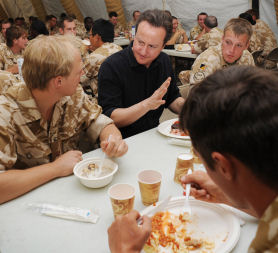‘Britain failed in Iraq and is failing in Afghanistan’
There is a widespread perception in Washington that Britain failed in Iraq and is failing in Afghanistan, an adviser to the Allied Rapid Reaction Corps tells Channel 4 News.

Professor Julian Lindley-French, an associate fellow at the Chatham House think tank in London, was commenting on David Cameron‘s announcement in the Commons that Britain and France will sign a new defence treaty on Tuesday.
Prof Lindley-French told Channel 4 News this was welcome in an age of austerity.
“There are many in the senior ranks of the US military and the US government, as well as on Capitol Hill, who believe British forces failed in Iraq and are failing in Afghanistan. British forces, although technically capable, simply lack the critical mass and technology to dominate the space in which they have been conducting operations.
“The UK is finding it hard to keep up with America. At the moment, the French have realised the Germans are not going to join them in creating an alternative to Nato.”
Ahead of his summit with French President Nicolas Sarkozy at Lancaster House in London, the Prime Minister said: “Tomorrow the British and French governments will sign new defence and security co-operation treaties …. partnership, yes, giving away sovereignty, no.”
The UK is finding it hard to keep up with America. At the moment, the French have realised the Germans are not going to join them in creating an alternative to Nato. Professor Julian Lindley-French
The agreement between the two European countries with the largest defence budgets is expected to include more joint training, the sharing of transport planes and co-operation on the use of aircraft carriers.
In a Chatham House report, Prof Lindley-French, who advises ARRC on how to handle military operations involving civilians, wrote: “A true strategic partnership between the world’s fifth and sixth largest economies and the second and third biggest cash spenders on defence could finally create a European pole of security and defence power that could in turn help to reinvigorate and re-balance a tired transatlantic relationship.
“In an age of austerity defence affordability will be at the heart of the Anglo-French agenda.”
He told Channel 4 News the Government’s decision to scrap the Nimrod reconnaissance plane programme in its Strategic Defence and Security Review (SDSR) was “stupid”.
This was an area where Britain and France could work together. “Restore Nimrod and build it into an Anglo-French force and share the costs.”
Alastair Cameron, head of the European security programme at the Royal United Services Institute, said France was also under pressure financially.
“Turning towards each other today makes sense by way of delivering cost-saving efficiencies that deliver important strategic co-operation for both the UK and France.”
In the last decade, Britain had been preoccupied with Iraq and Afghanistan, while France had operated in Chad, the Ivory Coast and Lebanon.
“In practice, we have seen that they haven’t operated at the same intensity within the same theatre since the Balkans.”
The Government’s plans were foreshadowed in the SDSR published last month. This said: “We will also intensify our security and defence relationship with France.
The UK and France are active members of Nato, the EU and the UN Security Council, are nuclear weapon states, and have similar national security interests.”Our Armed Forces are of comparable size and capability and it is clear that France will remain one of the UK’s main strategic partners.
” We already draw operational and financial benefit from close co-operation between our forces and defence communities and we will strengthen the relationship at all levels, and where possible, develop future military capabilities in complementary, cost-efficient ways.”